Nettoyeur haute pression à essence de 4 000 PSI - 4,0 GPM avec moteur Honda GX390 et pompe Comet Triplex
Nettoyeur haute pression à essence de 4 000 PSI - 4,0 GPM avec moteur Honda GX390 et pompe Comet Triplex
SKU:B4013HABC
LOGIN INTO YOUR DEALER ACCOUNT TO VIEW PRICING
Impossible de charger la disponibilité du service de retrait
Specifications
FRAME
F088A
ENGINE
GX390
PUMP
Triplex
CC
389
PSI
4,000
GPM
4.0
UNLOADER
External
SERIES
Industrial
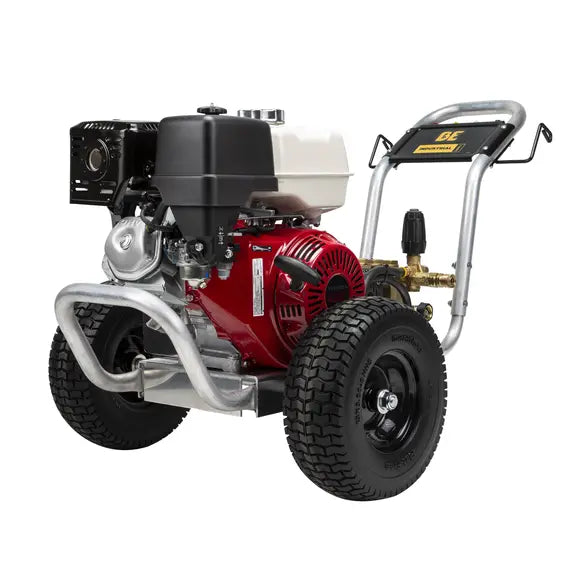
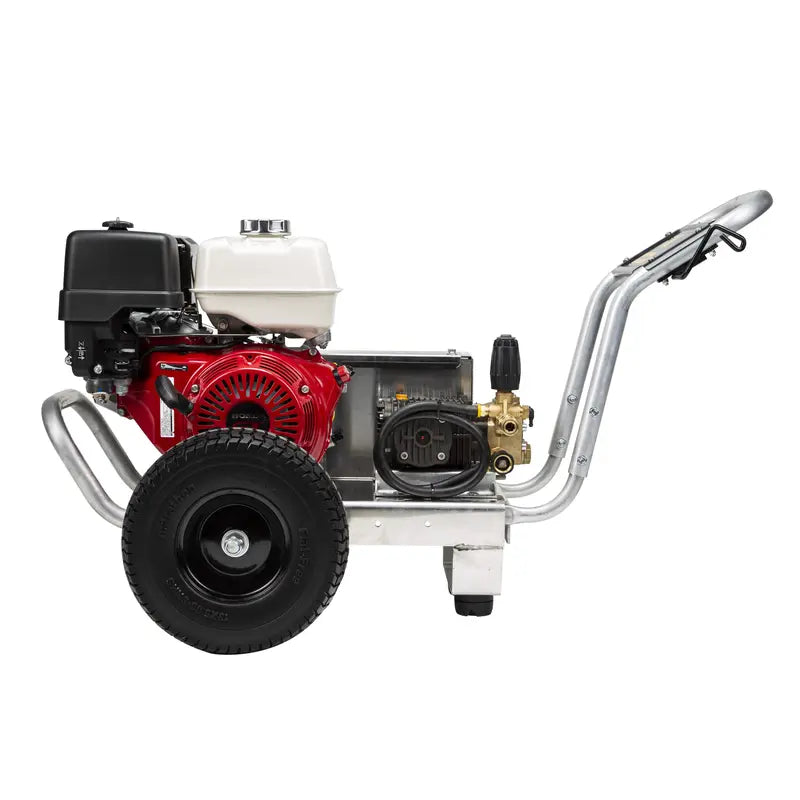
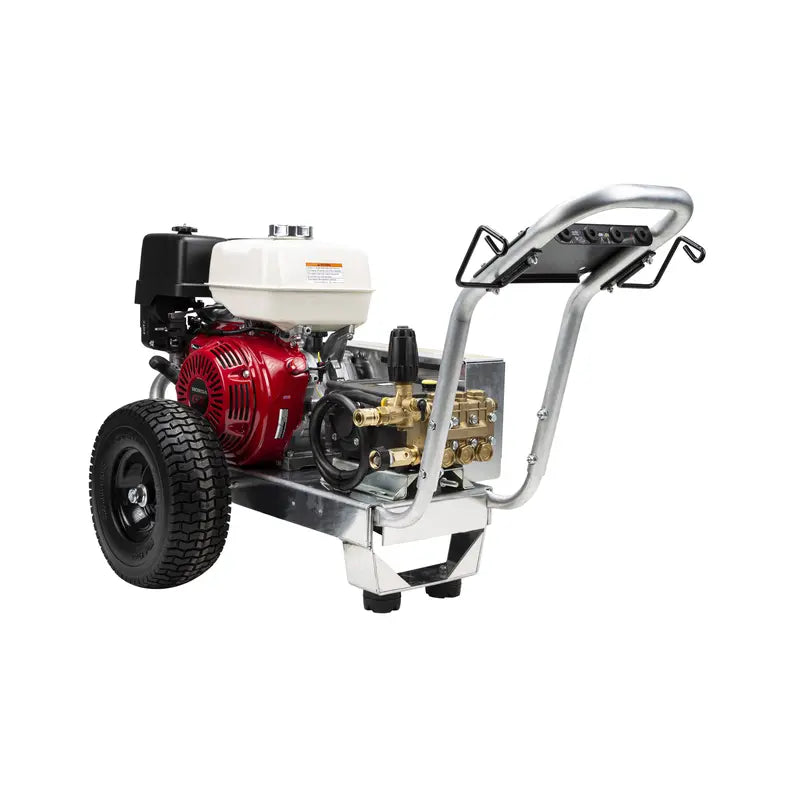

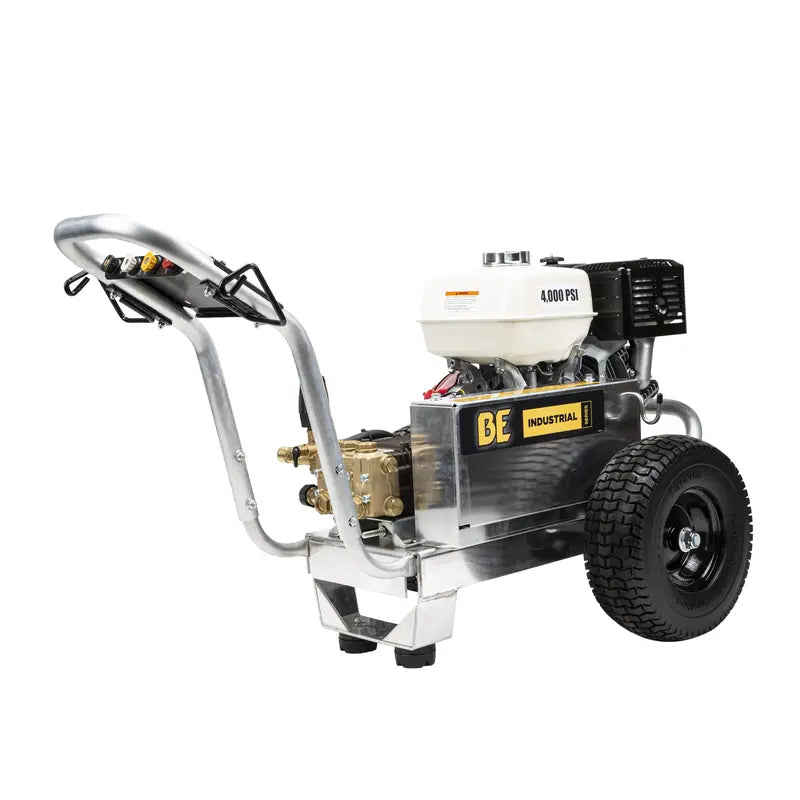
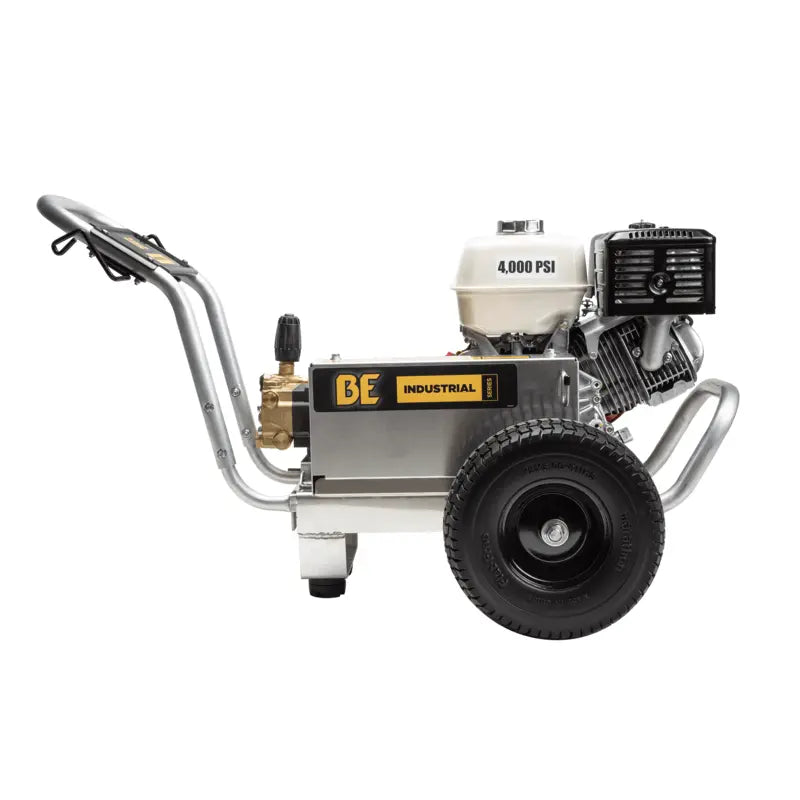
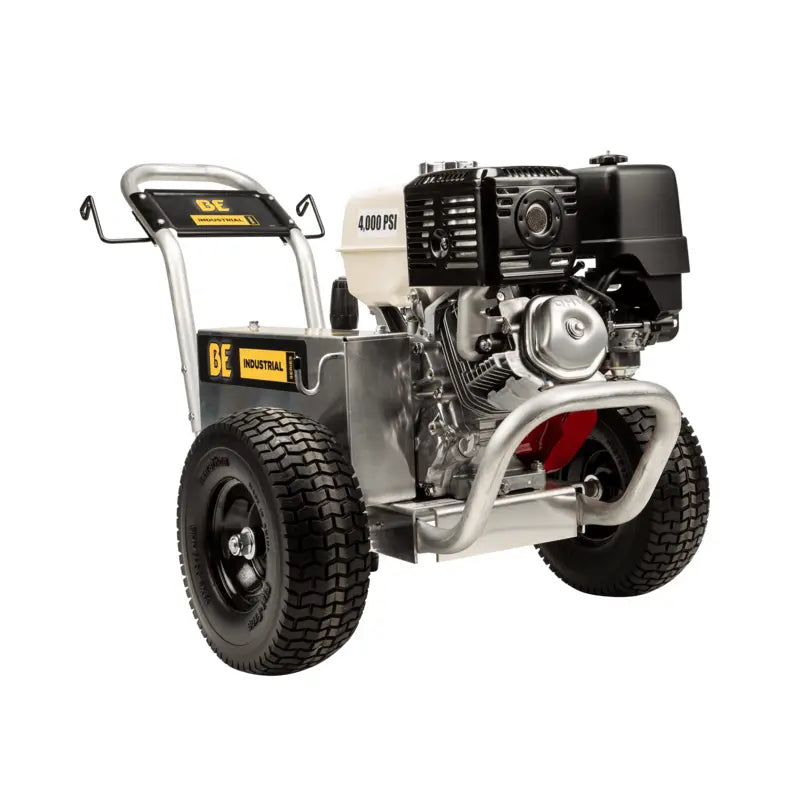
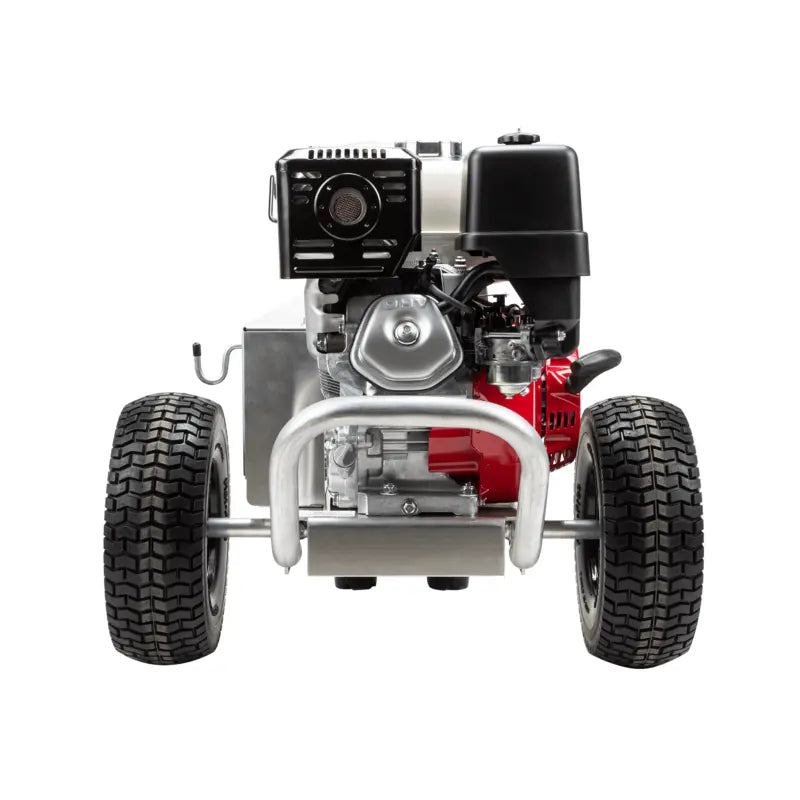
Product
Description
Moteur Honda commercial avec un excellent rapport poids/puissance. Conçu pour être utilisé toute la journée, tous les jours.
Le système d'entraînement par courroie assure la durée de vie la plus longue possible de la pompe en réduisant sa chaleur, ses vibrations et son régime.
Pompe triplex Comet de qualité industrielle avec corps renforcé, collecteur en laiton forgé, pistons en céramique solides, clapets anti-retour en acier inoxydable et soupape de décharge thermique.
Le déchargeur externe assure un refroidissement amélioré et peut être réglé pour dérivation de l'eau vers le sol afin de maximiser le système de refroidissement.
Des accessoires industriels sont inclus pour vous permettre de travailler immédiatement.
Cadre en aluminium réduit le poids et résiste à la corrosion. Comprend un espace de rangement pour les accessoires et des pneus anti-crevaison de 12 po pour une conduite facile sur les terrains accidentés.
Le produit réel peut différer des images présentées sur le site Web.
INFORMATIONS SUR L'EXPÉDITION
POIDS : 162 LBS
DIMENSIONS (L x l x H) : 81 x 63 x 68 cm
Compare Pressure Washers

Getting to Know Your
Pressure Washer
Key Features
High Pressure Hose
The high pressure hose is crucial for pressure washing, allowing for efficient and effective cleaning of various surfaces. Our high pressure hoses are designed to withstand the rigors of frequent use and are built to last with far higher durability than a typical garden hose. Our high pressure hoses provide ample reach and flexibility, making it easy to clean hard-to-reach areas. The quick-connect coupling ensures easy attachment and detachment, saving you time and effort.
Engine and Pump
Powerful Engines
Our power washers are equipped with powerful engines that deliver high pressure and flow rates, making quick work of tough cleaning jobs. These engines also offer excellent fuel efficiency, ensuring you get the most out of every drop of fuel. Our engines are designed to be durable and long-lasting, with features such as low-oil level monitoring and shutdown to prevent accidental engine damage. With a range of engine options available, including Powerease and Honda engines, BE Power Equipment has the engines that best suits your needs. Additionally, our power washers have straightforward maintenance requirements, making them easy to keep in top condition.
Water Temperature Control
Cold Water Capability
Our power washers are capable of handling cold water temperatures, making them ideal for cleaning surfaces in cold weather conditions. The cold water capability ensures that you can continue to clean effectively even in temperatures as low as 40°F (4°C). This feature is particularly useful for cleaning outdoor surfaces, such as driveways, garage doors, sidewalks, and patios, during the winter months. With our power washers, you can rest assured that you can tackle any cleaning job, regardless of the water temperature. Some models are also capable of using hot water for more demanding cleaning tasks.
Safety Features
Safety Precautions
When operating a power washer, it’s essential to take necessary safety precautions to avoid accidents and injuries. Always wear protective gear, including gloves, safety glasses, and a face mask, to prevent exposure to high-pressure water and potential debris. Ensure the area is clear of obstacles and tripping hazards, and never point the nozzle at people, animals, or windows. Additionally, be mindful of the water temperature, as cold water can be particularly hazardous. Always follow the manufacturer’s instructions and guidelines for safe operation to ensure a secure and risk-free cleaning experience.
Cleaning Capabilities
Versatile Cleaning
Your portable power washer is an incredibly versatile cleaning tool, capable of tackling a wide range of tasks. From washing cars to cleaning driveways, sidewalks, and patios to washing cars, boats, and outdoor furniture, these machines can handle it all. With the right attachments and accessories, you can even use your heavy duty pressure washer to clean hard-to-reach areas, such as gutters, downspouts, and roof edges and all other pressure washing applications. The high-pressure hose and quick-connect features make it easy to switch between different cleaning modes and access tight spaces. Whether you’re a homeowner or a professional, a pressure washer is an essential piece of equipment for any cleaning task. BE power washers come with a variety of spray nozzles and have numerous different spray nozzles available as accessories.
Maintenance and Repair
Easy Maintenance
To ensure your pressure washer continues to perform at its best, regular maintenance is crucial. Always follow the manufacturer’s guidelines for maintenance and repair, and take the time to inspect your machine regularly. Check the oil levels, fuel tank, and high-pressure hose for any signs of wear or damage. Clean the nozzle and spray gun regularly to prevent clogging, and store the machine in a dry, secure location when not in use. By following these simple maintenance tips, you can extend the life of your power washer and ensure it continues to provide reliable service for years to come. Both BE gas and electric pressure washers are simple to maintain.
Frequently Asked Questions about Pressure Washers
How to store a pressure washer?
To ensure the durability of your heavy duty pressure washer:
- Empty the gas tank to prevent fuel from degrading or clogging the engine.
- Empty the pump and hoses of any remaining water.
- Perform necessary maintenance before storage.
- Store in a dry area.
- Cover.
What is a pressure washer?
A power washer is a cleaning machine that uses a gasoline engine to power a high pressure water pump and nozzle. It’s used to clean driveways, decks, vehicles, outdoor furniture and more by spraying water at high PSI to remove dirt, grime, mold and other debris.
Many models also come with a detergent tank for added cleaning power.
How does a power washer work?
A power washer works by drawing water from a connected hose and pumping it through a high pressure nozzle. The gas engine powers the pump which pressurizes the water and then expels it through the nozzle at high speed to clean the surface. The water pressure is measured in PSI (pounds per square inch) and the flow rate is measured in GPM (gallons per minute).
Many models also feature adjustable water pressure settings to cater to different cleaning needs. BE makes pressure washing easy with models available for light jobs and heavy duty commercial cleaning projects.
Gas vs Electric power washers?
The main difference is that a gas pressure washer, known for its cleaning power, is powered by a gasoline engine, making it more powerful and portable, while an electric pressure washer is powered by electricity and is generally quieter and lighter.
Gas pressure washers are for heavy duty and large areas due to their durability, whereas electric pressure washers are for smaller jobs.
Your BE electric pressure washer is perfect for smaller jobs and built for portability, and we offer a wide range of electric models. Included with our electric models is a long extension cord for use anywhere around your house.
What to consider?
When choosing a gas pressure washer consider:
- Pressure (PSI): More PSI means more cleaning power but also more potential for damaging delicate surfaces.
- Flow Rate (GPM): More GPM means faster cleaning as more water is dispensed.
- Engine Power: Bigger engines mean more durability and power.
- Portability: Weight, handle design and wheel size for easier to move.
- Nozzles: Multiple spray nozzles to adjust the spray pattern for different tasks.
- Adjustable Nozzle: Allows for fine-tuning the spray intensity and pattern for various cleaning needs.
How much pressure do I need for?
The required pressure (PSI) and cleaning power depend on the surface you’re cleaning:
- Light duty (car washing, outdoor furniture): 1,300-1,800 PSI.
- Medium duty (patios, fences, decks): 2,000-3,000 PSI.
- Heavy duty (driveways, brick walls, large equipment): 3,000+ PSI.
Many pressure washers come with adjustable pressure settings to handle different cleaning tasks effectively.
Can a pressure washing damage surfaces?
Yes, a power washer can damage surfaces if used incorrectly. High pressure water can strip paint, dent soft surfaces or even cause structural damage if the pressure is too high or the nozzle is held too close to the surface. Always use the right PSI for the material you’re cleaning and keep a safe distance from delicate surfaces.
To prevent damage, consider using a model with adjustable pressure settings.
How to maintain your pressure washer?
To ensure the durability and smooth operation of a pressure washer:
- Change the oil as per manufacturer’s instructions.
- Clean or replace the air filter to ensure good airflow.
- Inspect and clean the nozzle regularly to prevent clogs.
- Drain the gas tank if you’re storing the washer for a long time.
- Check the hoses for leaks or damage and replace them if needed.
- Follow regular maintenance requirements to keep the washer in optimal condition.
Can I use a pressure washer in cold weather and low water temperature?
You can use a pressure washer in cold weather but it’s more difficult. The water flow rate in the hoses and pump can freeze and damage the equipment. If you plan to use your pressure washer in cold temperatures make sure to winterize it and store it in a warm area when not in use. You can also use anti-freeze solutions for pressure washers.
Some models are designed to use hot water, which can be particularly effective for cleaning in cold weather.
Do I need any accessories?
Common accessories for power washers:
- Different nozzles (0°, 15°, 25°, 40°, and soap nozzle) to adjust spray patterns.
- Extension wands for hard to reach areas.
- Surface cleaners for large flat areas like driveways and decks.
- Hose reels to store hoses neatly and prevent tangling.
- Foam cannon or detergent bottles for soap or cleaning solutions.
- Detergents for cleaning a wide variety of surfaces.








